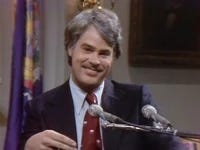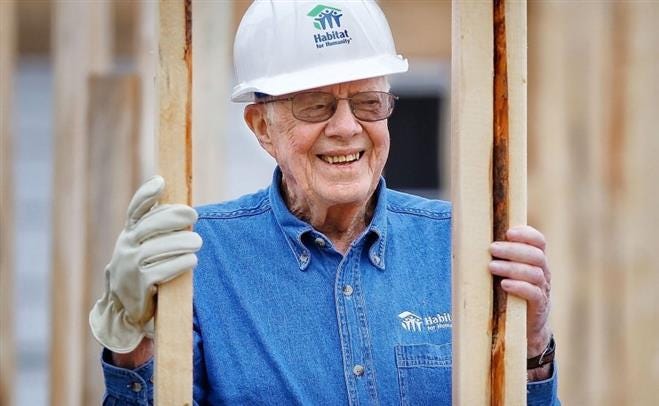The many public tributes and remembrances of former President Jimmy Carter, who died on December 29, brought to my mind the famous “adultery in my heart” interview in Playboy magazine in September of 1976.
The interview with then presidential candidate Jimmy Carter was published only two months before the election. The scandalous quote, which was printed and reprinted in newspapers, played and replayed on television, and performed for laughs by comedians (including a young Dan Aykroyd on season two of Saturday Night Live), was “I've looked on a lot of women with lust. I've committed adultery in my heart many times.”
In 1976 I was twelve years old and not particularly up on political news. But Carter’s interview was such a big story that it even made it onto my radar. In fact, I have a vague memory of reading the quote directly from Playboy magazine. That may be a created memory, but it’s not an impossible occurrence. In the 1970s, even without an internet, twelve-year-old boys could be resourceful when it came to accessing forbidden media.
Even as a pre-teen, I felt that the all the adult gasping, giggling, and speculation about Jimmy Carter’s statement was silly. This was many years before I would consider becoming a minister or a religion professor. Our family was not particularly churchy—maybe a little more so than the average American family, maybe a little less so than other families from the South. Still, I knew what Bible passage Jimmy Carter was referring to.
I remembered learning in Sunday school about the Sermon on the Mount in the gospel of Matthew. I remembered learning that Jesus taught that human intentions matter to God just as much as human actions—that someone who hated their brother or sister was no better than a murderer, that someone who looked at a person with adulterous intentions was no better than an actual adulterer.
When Carter, a self-described born-again Christian, admitted to “adultery of the heart,” he was not revealing lurid and exciting secrets. He was pushing back against the interviewer, who was equating Carter’s Christian faith with an attitude of moral superiority. Carter was acknowledging that just because he hadn’t actually had sex outside of his marriage, he was no better than “the guy [who] screws a whole bunch of women” (Carter’s own words from the interview).
Carter was saying that he, like everyone else, was a sinner in need of God’s grace, because he did not always live up to the high standards of the Sermon on the Mount. He sometimes lusted in his heart after the wrong person. As an adolescent boy, I understood how he felt. I mean, I wasn’t going to Playboy magazine primarily for the interviews.
I assumed others would understand Jimmy Carter’s feelings as well. I thought that all the fuss raised in the media by the Playboy interview was mostly for show and for laughs and would soon fizzle out. I thought that most adults who could vote would not consider Carter’s “adultery of the heart” a big deal.
It turns out I was wrong. Carter went on to win the election in November, but this interview almost sank him. Twenty years later, speaking with Terry Gross on NPR’s Fresh Air, Carter remembered the interview and the aftermath: “Playboy magazine came out. It was the biggest selling issue of Playboy in history. And my public opinion poll dropped fifteen percent in ten days.”
Perhaps the public’s overreaction to Carter’s statements was due to the fact that, by the 1970s, Americans were not as culturally familiar with the Bible as they once were. Americans did not recognize allusions to the Sermon on the Mount the same way they once did, a hundred years before—when Abraham Lincoln admonished his constituents, “let us judge not, that we be not judged.” Or even ten years before, when Martin Luther King instructed civil rights protestors to “turn the other cheek” as a means of nonviolent resistance to racial injustice.
If this was the case, if the majority of Americans were no longer familiar with the Bible, then surely evangelical Christians, a significant American subculture, would be. They were Carter’s own people! The prominent evangelical leaders of the day would be conversant enough with the Bible to decode Jimmy Carter’s “adultery of the heart.” They would surely understand that Carter was confessing a common human flaw that almost every honest man would also admit to.
Apparently not, according to Jimmy Carter’s reminiscences on Fresh Air: “the news reporters went all over the country asking famous preachers and TV evangelists about the issue. And they all said, no, no, I've never lusted after any woman except my wife.”
In the Playboy interview, when asked how his Christian faith would affect his presidency, Jimmy Carter said he hoped it would make him honest. Jimmy Carter was honest, sometimes more honest than people wanted him to be.
Whether he was a candidate reflecting on his sexuality in an interview for Playboy magazine, or a president calling on his fellow Americans to consider their own excesses during an energy crisis, Jimmy Carter’s honesty, and the humility that went along with it, did not always make him popular. It was one of the reasons he was only a one-term president.
But I appreciated Jimmy Carter’s honesty. It mattered to me at twelve years old to know that a former governor and presidential candidate admitted his vulnerabilities and flaws. It mattered to me in later years to know that a former president, who endured disappointment and failures, could reflect critically on his past and move on to a brilliant career of public service after he left the White House.
More importantly, Jimmy Carter’s honesty mattered to him, because he believed it mattered to God.
I believe he was right. Rest in peace, brother Jimmy Carter. “Well done, good and faithful servant. Enter into the joy of your Lord.”
That’s from Matthew too. Look it up.








Good one!
Oh, if only the Evangelical Christian Nationalists were familiar with the Sermon on the Mount. Their hate of others not like them, of minorities, immigrants, pro-life, LBGTQ+ being equal to a murderer. I can only imagine how that would go over in my rural Ohio community. I doubt they would appreciate the honesty now, just like they didn't then.